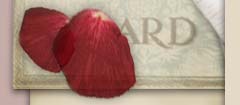Home > War Bride Stories > Johan (Hillis) DeWitt > Page 2
 |
| Click image for larger view. Luke Dewitt in uniform. Photo courtesy of Johan Dewitt. |
 |
| Click image for larger view. The RMS Aquitania. |
 |
| Click image for larger view. Johan Dewitt as a young mother. Photo courtesy of Johan Dewitt. |
Johan was one of them. One day, when she was in the barn cleaning up some cow manure, two young Canadian soldiers passed by. One of them was Luke DeWitt, who was recuperating at the hospital. Johan's first impressions weren't too positive. Here she was, up to her elbows in cow manure, and standing in front of her laughing were two young men.
"I was a heck of a mess," says Johan now, remembering that moment as though it happened only yesterday. "I don't know how in the name of heaven Luke and I got together, but he must have felt sorry for me." Before too long, Johan and Luke were dating and soon, they were engaged to be married.
It was a difficult decision for Johan's parents to let their oldest daughter marry a Canadian soldier. Like thousands of other Scottish parents, they had to face the inevitability that their daughter would eventually leave for Canada after the war. Johan's mother was dead set against Canada and the thought of her daughter leaving . But Johan's father, an engineer who had lived and worked there during the 1930s, simply loved the country. He thought the marriage presented great opportunities for Johan, and his opinion ruled the day.
In February, 1944 the young couple married and their first child, Betty, was born in November. Eighteen months later, Johan started the long journey by train and war bride ship that would take her to a new life and new home in Canada. On May 13, 1946, the day Johan left Scotland to join the other War Brides in London, her parents came down to the Central Station in Glasgow to see their daughter and grand-daughter off. Johan's father, who was always a sentimental sort, lifted little Betty high up in to the air and in front of the large crowd he sang these words to his only grandchild:
"Bonnie, Betty, is noo awa, safely oo'er the friendly main, many a heart will break in twa, should she no come back again."
The next day, Johan left Southhampton on board the War Bride ship RMS Aquitania. Seven days later, the ship sailed into Halifax harbour at Pier 21 and so began Johan's new life.
Johan admits it wasn't always easy. There was the culture shock of living in rural areas with outdoor toilets and no running water, cooking with wood stoves and the endless landscape of Canadian forest. Her husband was a journeyman plumber and in the post-war construction boom they moved around a lot. But he was a good man, and she remembers him with fondness.
Luke died suddenly in 1976, leaving Johan with three teenagers at home. She never remarried.
Now in her mid 70s, Joanne has had an interesting life that was shaped in large part by her wartime experiences. She is proud of the decision she made to marry a Canadian soldier and cross the ocean for love. Her Glaswegian accent is still strong, and her wartime memories are as vivid as the day they happened. And although Johan has lived in Canada for more than fifty years, she still calls Scotland "home". This article was written by Melynda Jarratt and originally appeared on the Gathering of the Clans on November 11, 1999
Back to Top
|
 |






